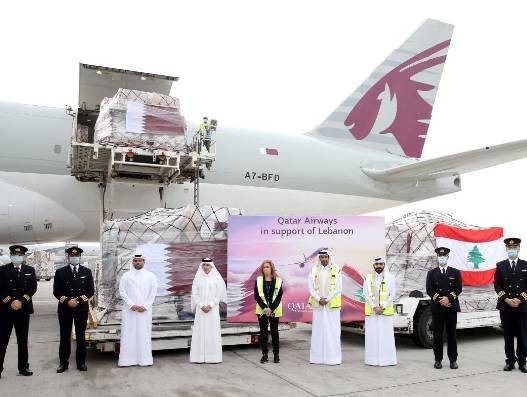
Covid-19: Here's how Qatar Airways raised the bar with its We Qare project
Qatar Airways Cargo is slowly and steadily recreating its business models to make innovation, sustainability and corporate social responsibility a real driver of change. With the launch of ‘We Qare’, the world’s largest cargo carrier has raised the bar for itself and for the industry

On Friday February 21, 2020, Hamad International Airport in Doha had a very unique take off. A convoy of five Qatar Airways aircraft made up of two Boeing 747F and three Boeing 777F carrying approximately 300 tonnes of medical supplies donated by the airline to support Coronavirus relief efforts. The five flights departed one after the other bound for Beijing, Shanghai and Guangzhou as part of Qatar Airways’ voluntary offer of free air cargo transportation for medical relief aid organised by Chinese Embassies and Consulates worldwide to fight the coronavirus emergency. 2,500,000 face masks and 500,000 bottles of hand sanitizer have been donated by Qatar Airways.
The February 21 convoy followed an earlier batch of critical medical relief aid transported by Qatar Airways to Shanghai on 2 February 2020. The shipment included 100,000 medical-grade N95 respiratory masks and 2,700 medical-grade disposable latex gloves, providing essential protection to healthcare professionals working around the clock at hospitals in Hubei Province, the epicentre of the virus.
When Qatar Airways undertook this humanitarian logistics mission in February, the world was different. Covid-19 was largely restricted to Wuhan, the sprawling capital of Central China’s Hubei province, and the novel coronavirus was making its way into Italy and Spain. Interestingly, it was only on February 11 that the World Health Organisation (WHO) named the novel coronavirus as SARS-CoV-2 or severe acute respiratory syndrome coronavirus 2 causing the disease, which the world now knows as Covid-19. It was only much later, on March 11, that the WHO declared Covid-19 as a pandemic.
Therefore, it is reasonably fair to trace the origins of “We Qare” project by Qatar Airways to how the world’s largest passenger airline and cargo carrier chose to respond to what would eventually become a global pandemic and would wipe off significant passenger aviation capacity world over.
“When this crisis began, we knew we had to contribute to support our friends in China. As one of the leading air cargo carriers in the world, we are in a unique position where we are able to provide immediate humanitarian support through the provision of aircraft and donating medical supplies as well as coordinating logistical arrangements,” said Akbar Al Baker, the group chief executive officer of Qatar Airways. Al Baker was present at the tarmac to see off the convoy of five freighters to China. Thus, ‘Qatar Airways - Because We Qare’ was formally announced in July.
Perhaps, no other airline in the world has taken such a concrete step to deal with the current pandemic and the affected people like the way Qatar Airways has done with the launch of ‘We Qare’ project. Remember, this is at a time when the world economy and global aviation industry are in doldrums. The campaign is aimed to play a key role in building tomorrow’s world.
The project, completely led by the cargo division of Qatar Airways, intends to ship one million kilos of freight for charities free of charge from July to the end of December. Under this initiative, charities will be able to use the services of Qatar Airways Cargo to transport humanitarian aid and medical supplies all over the world, free of charge. “Such action is unprecedented in its scale,” said an official press release announcing the project.
According to the project, Qatar Airways is donating 1 million kilos of freight to selected customers (freight forwarders) around the world to give to the charities of their choice. This will allow the movement of medical equipment, humanitarian relief and essential products to where they are most needed, free of charge.
“This action was triggered by the Covid-19 crisis. The pandemic is a tragedy for millions of people, and we looked for ways how we, as an airline, could help those in the greatest difficulty. This solution – shipping 1 million kilos of cargo free of charge – is a firm commitment for Qatar Airways Cargo. More than just words, we wanted to act and to adopt a comprehensive approach based on actions for the future,” said Guillaume Halleux, chief officer cargo at Qatar Airways.
For Qatar Airways Cargo, ‘We Qare’ is a highly ambitious project. According to Halleux, ‘One million Kilos’ is only the first chapter in an ambitious sustainability project. There will be many more chapters to this project and for the cargo carrier it is certainly for long term.
‘We Qare’, according to Qatar Airways Cargo, is built on the four fundamental pillars of sustainability – economy, environment, society and culture. It is a series of concrete air cargo actions designed to create a positive impact on the industry and the world.
It is also the beginning of a far reaching outreach project that the airline hopes will help reinforce the United Nation’s Sustainable Development Goals. Qatar Airways Cargo plans to play its small but critical and responsible role in the UN’s blueprint to achieve a better and more sustainable future for all.
Critics and competition would see this as a well calibrated marketing strategy. But is there anything wrong with it? Absolutely not. Qatar Airways always has been known to roll out projects and initiatives in scale and magnitude like no others in the industry. If we evaluate ‘We Qare’ purely from a marketing perspective, it is a fantastic campaign that understood the consumers and empathised with the world.
In marketing, the aim is to impart a message to the consumers, primarily with the goal of triggering a purchasing action. Part of sending that message comes from knowing what your audience is going to find negative and unfavorable to them. So the current global events, particularly the Covid-19 pandemic, have severely impacted people around the world. Therefore, marketers, brands and organisations have to avoid certain words and phrases because of the negative emotions they can evoke. So words like together, safe, care, allow people to have positive associations and emotions work very well. To that extent ‘We Qare’ has been an innovative and a fresh campaign in the Covid-19 pandemic times.
The rise of Qatar Airways and then to be officially crowned in June this year as the largest passenger and cargo airline in the world despite the illegal blockade imposed by neighbouring countries on 5 June 2017 and Covid-19 crisis, is in itself a story of strength and resilience. And its hub, the Hamad International Airport, was also declared the third best airport in the world in June.
Since the blockade, the freight division of Qatar Airways has been vigorously pursuing innovation and creativity in the face of adversity. The carrier knew the cost it had to pay operating under severe unfavourable conditions. The airline reiterated its determination and commitment to growth without hiding the apparent concerns that it will underperform if the blockade continues. But the fact of the matter is, the blockade, more than three years old, continues even today and Qatar Airways has not relented its pursuit for excellence. And they have proved why they are the best in the world.
Following the peace deal between Israel and UAE that celebrated normalisation agreement between the two countries, there is optimism that the three-year-old Qatar blockade could be over in the next few weeks. David Schenker, a senior US State Department official for the Middle East, speaking at a recent virtual event hosted by the Washington, DC-based Brookings Institute, said that there is “some movement” and it is going to be “a matter of weeks”. However, Qatar continues to vehemently deny all allegations.
According to the latest World Air Transport Statistics by International Air Transport Association (IATA), for the year 2019, Qatar Airways is at the second rank in terms of scheduled freight tonne kilometres (FTKs). Federal Express (FedEx Express) stands at the top of the ranking. And in 2018, Qatar Airways was third behind FedEx Express on the top and Emirates on the second. However, it is reasonable not to compare the Qatar Airways’ ranking with FedEx Express but rather with Emirates. While Qatar Airways made rapid growth over the last three years in terms of cargo carried, Emirates just managed to retain its position in 2018 but in 2019 the Dubai-based carrier slipped by two positions to be at the fourth rank.
Today the Qatar Airways Cargo fleet includes two Boeing 747-8 freighters, 21 Boeing 777 freighters and five Airbus A330 freighters. The Covid-19 has made the carrier to delay the phased retiring of its A330 freighter fleet. The original plan of the carrier was to retire all of them by the end of this year and replace them with the five brand new B777 freighters ordered at the Paris Air Show in 2019. Recently Hungarian government purchased one of the five A330 freighters from Qatar Airways.
Qatar Airways thinks that with such global ranking comes significant responsibility to the human society and to the air freight industry. And ‘We Qare’ is a demonstration of the great responsibility by the world’s largest cargo carrier. It believes that the history of the airfreight industry must change in line with the new challenges the world is facing.
Qatar Airways Cargo wants to change the way the world perceives the air freight industry and they are beginning to change themselves first. They are being the change that they want to see in the world.
For the future it is imperative to be socially responsible and sustainable. Take care of the present to build a future. ‘We Qare’, Qatar Airways knows, is also good for the business.

